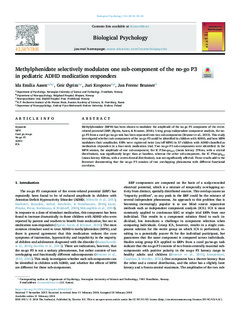Methylphenidate selectively modulates one sub-component of the no-go P3 in pediatric ADHD medication responders
Journal article, Peer reviewed
Published version
Permanent lenke
http://hdl.handle.net/11250/2585270Utgivelsesdato
2018Metadata
Vis full innførselSamlinger
- Institutt for psykologi [3143]
- Publikasjoner fra CRIStin - NTNU [38525]
Sammendrag
Methylphenidate (MPH) has been shown to modulate the amplitude of the no-go P3 component of the event-related potential (ERP; Øgrim, Aasen, & Brunner, 2016). Using group independent component analysis, the no-go P3 from a cued go/no-go task has been separated into two sub-components (Brunner et al., 2013). This study investigated whether sub-components of the no-go P3 could be identified in children with ADHD, and how MPH modulates their amplitudes. ERPs were registered twice (on/off MPH) in 57 children with ADHD classified as medication responders in a four-week medication trial. Two no-go P3 sub-components were identified. In the MPH session, the amplitude of one sub-component, the IC P3no-goearly (mean latency 378 ms, with a central distribution), was significantly larger than at baseline, whereas the other sub-component, the IC P3no-golate (mean latency 428 ms, with a centro-frontal distribution), was not significantly affected. These results add to the literature documenting that the no-go P3 consists of two overlapping phenomena with different functional correlates.

